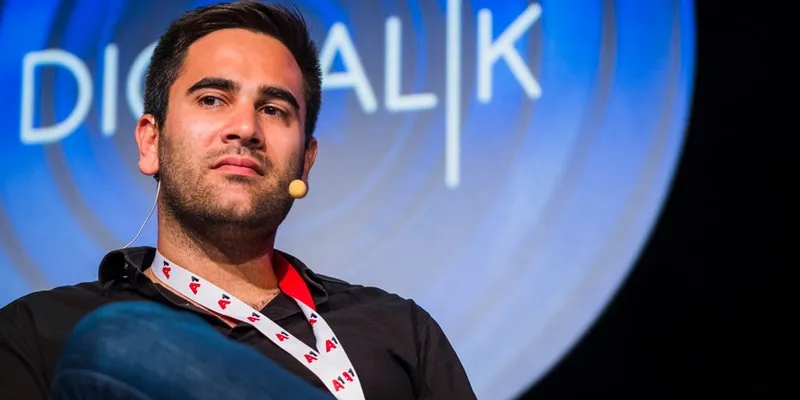We will invest in blockchain startups that solve Indian problems: Nikola Stojanow of AE Ventures
In an exclusive interview with YourStory AE Ventures CEO Nikola Stojanow explains how the blockchain technology is becoming mainstream in many parts of the world, and why India is a prime market for them to invest in.
Nikola Stojanow, the CEO of AE Ventures (also called Aeternity Ventures), runs a blockchain fund that has funded 15 startups in two years.
The company had developed ‘Aeternity blockchain’ as a scalable smart contract platform engineered to address fundamental challenges native to earlier blockchains.
The Aeternity blockchain was established by Yanislav Malahov in the year 2016. He built Aeternity as a blockchain solution for the scalability problem that is prevalent in this technology, getting ahead of the Bitcoin and Ethereum blockchains.
It can power games, payments, identity, decentralised finance, registries, token economies, and supply chains.
Nikola joined Aeternity in 2016. He was working for a pharmaceutical corporation when he understood blockchain technology’s potential. A law school graduate, Nikola rose from a corporate business development head to a CEO of a global fund because of his ability to learn new technologies and their impact on society.
These are exciting times for the fund as they are actively scouting for blockchain startups in India with founders who have the experience of building technology with impact, creating value for users.
In an interaction with YourStory, the CEO spoke about AE Ventures and its journey so far.

Nicola Stojanow
Edited excerpts:
YourStory: Talk us through your fund’s journey and ethos.
Nikola Stojanow: The Aeternity blockchain was built with a vision of powering decentralisation. The platform itself offers several advantages as compared to existing blockchain protocol, but at its core, the company aims to enable developers and entrepreneurs working on decentralised tech solutions. AE Ventures is one more manifestation of this philosophy.
With AE Ventures, we have invested in 15 companies over the last two years. These have been blockchain companies that have gone ahead and built amazing PoCs. The ethos is around decentralisation, transparency, and the entrepreneurial spirit of wanting to disrupt for good.
YS: Why choose blockchain when the world is heading towards AI?
NS: I think this is a very subjective question. All emerging technologies hold promise. Blockchain operates at a different layer to AI and has its own set of tremendous use cases. AI is older and has matured a lot more than blockchain, but the opportunities are vast in both places.
Furthermore, our Founder, Yanislav Malahov, is one of the earliest pioneers in this space. He has worked with the likes of Vitalik Buterin even before the launch of Ethereum. His insight and vision for a decentralised platform are revolutionary and a lot of our company’s direction is defined by his background as well.
YS: Do you see AI and blockchain converging?
NS: There are several areas where blockchain and AI converge. Blockchain’s inherent consensus mechanisms will be greatly useful in auditing AI-based decision making. Then there is decentralisation, which also creates far reaching and more scalable monetisation models on insights gathered from distributed data.
Blockchains are immutable, and thereby provide great security solutions and ensure data integrity for AI applications. Think of blockchain as the foundation for which several great AI applications can be built.
YS: How has blockchain evolved since AE Ventures was started?
NS: We started AE Venutures around the time of the crypto boom of 2017 and 2018. This was a time when almost anyone with a little bit of blockchain knowledge, a good whitepaper, and a marketing team could raise a huge round of money.
However, the bear market has cut a lot of these companies to size. Our focus has always been on good founders who are building implementable blockchain solutions.
These companies have always existed, but post the bear market, we’re finding a lot more of them.
Another interesting development is enterprise and government adoption. For example, APMnet, one of our portfolio companies, has partnered with Greenpeace for a blockchain PoC. I’m seeing a lot more large conglomerates that are open to working with startups building on cutting-edge technologies.
YS: Can you tell us about your portfolio companies and what they hope to do with blockchain?
NS: Our investments have typically been between $10,000 and $100,000. We like to enter at a seed/pre-seed level and predominantly through our Starfleet Accelerator programme.
We are quite industry-agnostic; the only common thread we look for is the use of blockchain tech and its implementability. We have invested in companies like Abend - a ticketing platform, Comrade Cooperative - a digital cooperative, and several more.
YS: What are your thoughts on nation states creating cryptos?
NS: This is a multivariate issue. On the one hand, there is greater security and a more robust technology governing the flow of currency. We can’t discount the environmental benefits of reducing the demand on physical money.
On the other hand, if the underlying economic policies don’t change, then there isn’t much change that the use of a cryptocurrency can bring, as opposed to existing digital payments.
Having said that, we’re yet to see a proper mainstream implementation of a sovereign cryptocurrency. Best to wait and watch.
YS: How do you see public blockchain taking shape in the next five years?
NS: I see three big changes that should happen in blockchain if the past five years are anything to go by:
- A clearer understanding of blockchain as a technology product – Currently, most conversations around blockchain and cryptocurrencies are in the realm of return on investments, price speculations, and regulations. Blockchain is and has always been a technology disruption, and more entities in the near to mid- term will start to think of blockchain as a technology solution. After the hype dies down, it will be recognised and utilised for more clearer use cases.
- More ubiquity and better user experience - Much like how we use the internet today, blockchain-powered applications will not be known for the fact that they’re built on the blockchain. I expect the user experience of blockchain apps to be at par with our current applications, thereby bringing in a non-tech crowd that just enjoys the benefit of the blockchain and doesn’t even know about it.
- Lesser stigma and lesser volatility - If the above two happen, then the increased influx of people who use blockchain and cryptocurrencies will reduce the regulatory ire that the industry currently faces. More users will also reduce price volatility and market fluctuations, making cryptos a viable asset class for investments.
YS: How is blockchain evolving in China, the US, Japan, Eastern and Western Europe?
NS: I tend to think of the blockchain ecosystem as quite region- agnostic.
I can name similar projects from each of these countries that are attempting to solve the same problem. I think this is because there are several fundamental problems that need to be solved currently, most notably speed and scale.
Once there are comprehensive solutions to all of these problems, we will see blockchains being implemented to region-specific problems. I foresee that happening in the next 2-3 years.
YS: What are you expecting from startups in India?
NS: We will be making investments in 4-5 indian startups by the end of the first Aeternity Starfleet Accelerator programme.
Our investment thesis will be similar to what we’ve done in Malta and Kenya: good founders with a proven capability to build technology products that can scale, and a strong underlying blockchain use case.
Apart from this, I expect to see strong Indian problems that can be solved by blockchain and I’m looking forward to seeing the fabled Indian tech and development prowess.
YS: How have you have raised money for your fund?
NS: It is important to mention that this is not a fund, but a special purprose vehicle that invests in early-stage projects. We are planning to structure a proper fund in the future, but this does take some time and our focus at this stage is to enable projects to build on Aeternity blockchain.
Partnering up with local governments and innovation centres has been a great way to achieve synergies and possible co-investments in order to increase the deal flow.
Our interest here lies in establishing different hubs around the world that are linked to one operational overview and an excellence centre, making sure that the quality of programmes, projects, and operations matches the highest standards.
(Edited by Evelyn Ratnakumar)



![[Techie Tuesday] Meet Benson Samuel, the architect of India's first crypto algorithm, who is now looking to solve another global problem](https://images.yourstory.com/cs/2/fd6b2ee0c6f411e8af1c974e95f3b2db/Techie-Tuesday-feb-10-1581357241849.png?fm=png&auto=format&h=100&w=100&crop=entropy&fit=crop)





